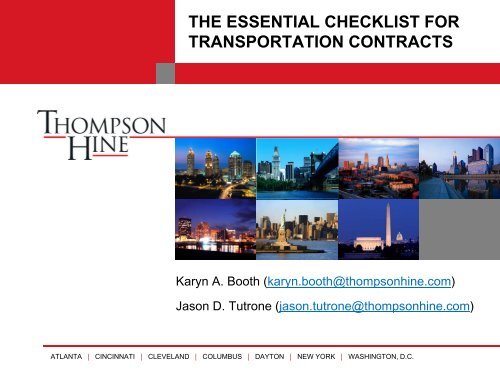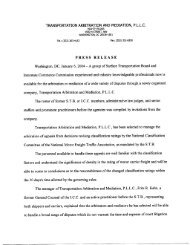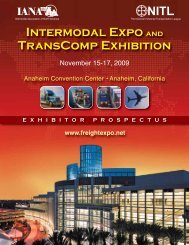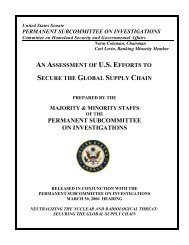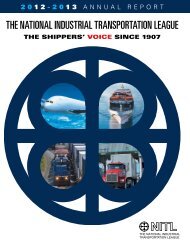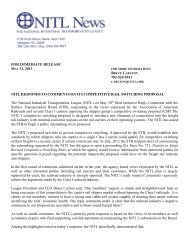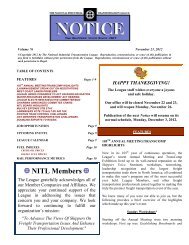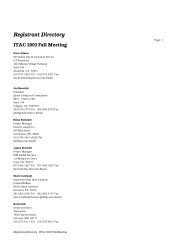THE ESSENTIAL CHECKLIST FOR TRANSPORTATION CONTRACTS
THE ESSENTIAL CHECKLIST FOR TRANSPORTATION CONTRACTS
THE ESSENTIAL CHECKLIST FOR TRANSPORTATION CONTRACTS
Create successful ePaper yourself
Turn your PDF publications into a flip-book with our unique Google optimized e-Paper software.
<strong>THE</strong> <strong>ESSENTIAL</strong> <strong>CHECKLIST</strong> <strong>FOR</strong><br />
<strong>TRANSPORTATION</strong> <strong>CONTRACTS</strong><br />
Karyn A. Booth (karyn.booth@thompsonhine.com)<br />
Jason D. Tutrone (jason.tutrone@thompsonhine.com)<br />
ATLANTA | CINCINNATI | CLEVELAND | COLUMBUS | DAYTON | NEW YORK | WASHINGTON, D.C.
Topics for Discussion<br />
• General Observations About Transportation Contracts<br />
• Contracting Framework<br />
• Key Transportation Contract Terms<br />
Modal Specific Issues<br />
• Contract Negotiating Strategies for Shippers<br />
ATLANTA | CINCINNATI | CLEVELAND | COLUMBUS | DAYTON | NEW YORK | WASHINGTON, D.C.<br />
2
General Observations<br />
• Significance of contracting has increased following partial<br />
deregulation of transportation industries during 1980’s and 1990’s<br />
• Depending on transportation mode regulation may apply to contract<br />
movements<br />
Rail contracts are outside of STB jurisdiction<br />
Truck contracts may include waiver of regulation, except for<br />
registration, insurance and safety<br />
Ocean contracts for containerized freight are regulated by the FMC<br />
Some contracts incorporate specific regulations (e.g. Carmack, safety)<br />
ATLANTA | CINCINNATI | CLEVELAND | COLUMBUS | DAYTON | NEW YORK | WASHINGTON, D.C.<br />
3
General Observations<br />
• Contracting between transportation service providers (e.g. carriers,<br />
3PLs) and customers is the primary means of transacting business<br />
series of shipments vs. spot shipments<br />
• Benefits of well-drafted contracts include:<br />
cost control and predictability<br />
limitation of risk / liability<br />
customization to address commercial needs & requirements<br />
clarity of expectations<br />
• Contract planning and strategy are important considerations<br />
ATLANTA | CINCINNATI | CLEVELAND | COLUMBUS | DAYTON | NEW YORK | WASHINGTON, D.C.<br />
4
Contracting Framework<br />
ATLANTA | CINCINNATI | CLEVELAND | COLUMBUS | DAYTON | NEW YORK | WASHINGTON, D.C.<br />
5
Contracting Framework<br />
• Structure and terms of transportation contracts vary based on<br />
several factors:<br />
mode(s) of transportation<br />
geographic scope (domestic vs. international)<br />
types of services to be provided (transportation, logistics, customs)<br />
inclusion of subsidiaries and affiliates<br />
corporate objectives (e.g. uniformity in terms)<br />
corporate resources (e.g. contract administration)<br />
government regulation<br />
market conditions (capacity, demand, competitive landscape)<br />
ATLANTA | CINCINNATI | CLEVELAND | COLUMBUS | DAYTON | NEW YORK | WASHINGTON, D.C.<br />
6
Contracting Framework<br />
• Self-contained documents vs. multiple documents<br />
general terms<br />
modal specific terms<br />
• No one-size-fits-all approach<br />
• Contract structure can be developed to satisfy your primary<br />
business and service needs<br />
ATLANTA | CINCINNATI | CLEVELAND | COLUMBUS | DAYTON | NEW YORK | WASHINGTON, D.C.<br />
7
Key Transportation Contract Terms<br />
ATLANTA | CINCINNATI | CLEVELAND | COLUMBUS | DAYTON | NEW YORK | WASHINGTON, D.C.<br />
8
Services: Scope and Requirements<br />
• Clearly define the scope of services to be performed:<br />
mode(s) of transport<br />
type of service (e.g., transportation, brokerage, freight forwarding)<br />
geographic scope (e.g., interstate, intrastate, foreign, Canada/Mexico<br />
cross-border)<br />
exclusivity of provider<br />
consider including SOPs as contract attachments to clarify operations<br />
• Develop service requirements that promote efficiencies, reliability,<br />
and planning<br />
capacity needs / guarantees<br />
equipment availability and condition (tractors, trailers, containers,<br />
chassis, railcars)<br />
e-commerce / communication<br />
ATLANTA | CINCINNATI | CLEVELAND | COLUMBUS | DAYTON | NEW YORK | WASHINGTON, D.C.<br />
9
Services: Scope and Requirements<br />
• Measure carrier performance by developing indicators for on-time<br />
deliveries, cargo loss/damage, equipment supply, etc.<br />
Some contracts include remedies for failure to meet the indicators (e.g.<br />
right to cure, termination, financial penalties)<br />
• Address specific service issues and concerns<br />
Refused deliveries (notice, cargo disposition instructions, liability for<br />
storage or other assessorial charges)<br />
Late deliveries (delay damages, plant shut-downs)<br />
Rolled cargo (int’l ocean)<br />
ATLANTA | CINCINNATI | CLEVELAND | COLUMBUS | DAYTON | NEW YORK | WASHINGTON, D.C.<br />
10
Minimum Volume Commitments<br />
• A minimum volume commitment (MVC) may be a standard<br />
commercial practice or required by law<br />
• Truck and Air: MVCs are less common and limited to special<br />
circumstances<br />
• Rail: MVC is standard commercial term<br />
• International Ocean: MVC is required by law<br />
• Failure to meet MVC can lead to financial penalties / liquidated<br />
damages<br />
• Volume commitments can be used to obtain leverage and have an<br />
impact on rates, capacity guarantees, termination, and force<br />
majeure<br />
ATLANTA | CINCINNATI | CLEVELAND | COLUMBUS | DAYTON | NEW YORK | WASHINGTON, D.C.<br />
11
Volume Commitments (Int’l Ocean)<br />
• Carriers prefer to spread cargo volumes evenly throughout the term<br />
of the contract<br />
Problematic for seasonal shippers or for those with unpredictable<br />
demand<br />
• Consider capacity needs beyond the volume commitment<br />
• Strategies when incorporating a volume commitment<br />
High commitment can improve rate levels and space guarantees<br />
Low commitment can reduce exposure for liquidated damages<br />
ATLANTA | CINCINNATI | CLEVELAND | COLUMBUS | DAYTON | NEW YORK | WASHINGTON, D.C.<br />
12
Licensing, Authority, and Safety Fitness<br />
• Service providers should warrant that they and their subcontractors<br />
have and will maintain, all necessary licenses, permits, and<br />
authorities to conduct the services at no additional cost<br />
• Shippers can monitor compliance on their own or by requiring<br />
immediate notice of revocation or other adverse action<br />
• Consider termination upon breach of licensing, authority, and safety<br />
fitness requirements<br />
• Truck Issues:<br />
Specify FMCSA safety fitness rating (Satisfactory, Conditional, Unfit)<br />
requirements based on your risk preferences<br />
Set BASICs performance standards, if desired, under CSA<br />
ATLANTA | CINCINNATI | CLEVELAND | COLUMBUS | DAYTON | NEW YORK | WASHINGTON, D.C.<br />
13
Contract Term<br />
• A longer duration can increase stability and predictability in freight<br />
costs<br />
May be desirable if market conditions favor rising rates<br />
• Shorter terms may be desired if there is over-capacity, limited<br />
volumes, falling rates, or a new service provider is involved<br />
• Consider contract cycles that are aligned with your business needs<br />
(e.g., calendar year, fiscal year)<br />
• Consider evergreen clauses, i.e. automatic renewal<br />
• Term can affect contract negotiation strategy—longer terms equate<br />
to greater freight spend and may impact negotiation of liability &<br />
other terms<br />
ATLANTA | CINCINNATI | CLEVELAND | COLUMBUS | DAYTON | NEW YORK | WASHINGTON, D.C.<br />
14
Rates<br />
• Rates may be “all-in” or itemized, depending on the mode of<br />
transportation and party preferences<br />
• To promote rate stability, limit all rates and charges to those in the<br />
contract<br />
Require rate changes or additions to be mutually agreed and set forth<br />
in a formal amendment to contract<br />
Be wary of incorporation of carrier tariffs and shipping documents which<br />
can result in rate add-ons, surcharges, etc.<br />
Int’l Ocean: Address general rate increases, peak season charges, and<br />
unilaterally imposed rates and charges<br />
ATLANTA | CINCINNATI | CLEVELAND | COLUMBUS | DAYTON | NEW YORK | WASHINGTON, D.C.<br />
15
Payment<br />
• Specify invoice requirements (e.g., frequency, contents)<br />
• Define responsibility for payment of disputed charges and resolution<br />
of such charges<br />
• Address provider responsibility for payment to its subcontractors,<br />
including indemnity for payment claims by subcontractors<br />
• Consider creating right to setoff debts owed by carrier (e.g., cargo<br />
loss and damage claims)<br />
Usually difficult to obtain<br />
ATLANTA | CINCINNATI | CLEVELAND | COLUMBUS | DAYTON | NEW YORK | WASHINGTON, D.C.<br />
16
Liability: Cargo Loss and Damage<br />
• Evaluate the level of protection required for your commodities<br />
• Define the period of liability using events, provider’s level of control<br />
over the cargo, or both<br />
“. . . the provider has care, custody, or control over the cargo, which<br />
provider will be deemed to have from the time the cargo is tendered to<br />
provider at the origin through delivery at the destination”<br />
• Address how liability will be measured (e.g., full actual value,<br />
replacement value, invoice value)<br />
• Specify any limitation on liability<br />
Higher limits usually result in higher rates due to provider’s exposure<br />
Consider the value of the cargo<br />
ATLANTA | CINCINNATI | CLEVELAND | COLUMBUS | DAYTON | NEW YORK | WASHINGTON, D.C.<br />
17
Liability: Cargo Loss and Damage<br />
• Truck<br />
Cargo damage occurring during truck carriage covered by a bill of<br />
lading is governed by the Carmack Amendment<br />
• Carmack provides for full loss and damage coverage but allows for liability<br />
limitations or released rates via “agreements”<br />
Some contracts incorporate the Carmack Amendment; and others<br />
include liability limits<br />
For cross-border shipments to Mexico, be wary of application of low<br />
liability limits under Mexican law<br />
ATLANTA | CINCINNATI | CLEVELAND | COLUMBUS | DAYTON | NEW YORK | WASHINGTON, D.C.<br />
18
Liability: Cargo Loss and Damage<br />
• Rail<br />
Cargo damage occurring during rail carriage covered by a bill of lading<br />
is governed by the Carmack Amendment<br />
• Carmack provides for full loss and damage coverage but allows for liability<br />
limitations via “agreements”<br />
Some rail contracts incorporate the Carmack Amendment<br />
No liability limit imposed by law but rail circulars may impose a limit of<br />
liability<br />
ATLANTA | CINCINNATI | CLEVELAND | COLUMBUS | DAYTON | NEW YORK | WASHINGTON, D.C.<br />
19
Liability: Cargo Loss and Damage<br />
• Air<br />
Most international shipments to/from US: Montreal Convention limits<br />
recovery to 19 SDRs ($29.08) per kilogram<br />
Domestic US: No liability limit imposed by law but most contracts<br />
incorporate a per pound limit<br />
• Ocean<br />
US Law: Carriage of Goods by Sea Act (COGSA) provides for recovery<br />
of $500 per package<br />
• Package definition impacts recovery<br />
Some shippers negotiate application of Hague-Visby Rules, which<br />
permit recovery of 666.67 SDRs ($1,020) per package or 2 SDRs<br />
($3.06) per kilogram, whichever is higher<br />
ATLANTA | CINCINNATI | CLEVELAND | COLUMBUS | DAYTON | NEW YORK | WASHINGTON, D.C.<br />
20
Delay<br />
• Determine the effect of delays and need for protection<br />
• Define the scope of liability (e.g., plant shutdown costs, expedited<br />
transportation costs, chargebacks)<br />
• Difficult to obtain reimbursement for indirect consequences of<br />
delays<br />
• Carriers may be more agreeable to delay liability if liability limits<br />
apply<br />
• Air<br />
Most international shipments to/from US: Montreal Convention limits<br />
recovery to 19 SDRs ($29.08) per kilogram<br />
Domestic: no liability limit imposed by law<br />
ATLANTA | CINCINNATI | CLEVELAND | COLUMBUS | DAYTON | NEW YORK | WASHINGTON, D.C.<br />
21
Delay<br />
• Ocean, Rail, Truck<br />
To recover for delay liability a shipper must prove its delay damages<br />
were reasonably foreseeable<br />
No delay liability limit imposed by US law<br />
If on-time performance is important, shipper should attempt to negotiate<br />
delay liability protection<br />
ATLANTA | CINCINNATI | CLEVELAND | COLUMBUS | DAYTON | NEW YORK | WASHINGTON, D.C.<br />
22
Cargo Claims<br />
• Assess your ability to discover cargo damage and file a claim<br />
• Address claims filing deadlines, as well as the deadlines for the<br />
carrier to acknowledge and process the claim<br />
• Consider requiring a written explanation for any denial<br />
• Be wary of agreeing to file a claim as a prerequisite to a lawsuit<br />
ATLANTA | CINCINNATI | CLEVELAND | COLUMBUS | DAYTON | NEW YORK | WASHINGTON, D.C.<br />
23
Cargo Claims<br />
• Rail and Truck<br />
9 month minimum claim period by law; claim filing is a prerequisite to<br />
lawsuit<br />
2 year minimum statute of limitations period applies<br />
Can negotiate alternative claims and SOL periods by agreement<br />
• Ocean<br />
A notice of claim must be made immediately for apparent loss and<br />
damage; 3 days for non-apparent loss and damage; not a prerequisite<br />
to filing a lawsuit<br />
Lawsuits for loss and damage must be filed within 1 year after delivery<br />
ATLANTA | CINCINNATI | CLEVELAND | COLUMBUS | DAYTON | NEW YORK | WASHINGTON, D.C.<br />
24
Cargo Claims<br />
• Air – Montreal Convention (most international US shipments)<br />
Claim is prerequisite to lawsuit<br />
Claims must be filed immediately, but in no case later than 14 days for<br />
damage/loss and 21 days for delay<br />
Lawsuits must be brought within 2 years of aircraft arrival at destination<br />
ATLANTA | CINCINNATI | CLEVELAND | COLUMBUS | DAYTON | NEW YORK | WASHINGTON, D.C.<br />
25
Indemnity<br />
• Parties should include provisions requiring one or both parties to<br />
indemnify the other against liability, claims or damages<br />
• Indemnity may cover negligence, contract breaches, failure to<br />
comply with laws, conduct of third parties<br />
• Claims subject to indemnity could include those of the contracting<br />
parties or be limited to claims by third parties<br />
• Truck Issue: Be wary of anti-indemnity statutes<br />
ATLANTA | CINCINNATI | CLEVELAND | COLUMBUS | DAYTON | NEW YORK | WASHINGTON, D.C.<br />
26
Insurance<br />
• Assess the potential liability you may incur for acts by the carrier<br />
• Insurance coverage should be sufficient to cover such liability risks<br />
(e.g. commercial liability, loss or damage to cargo, worker’s<br />
compensation, errors & omissions)<br />
• Coverage can be used to remove “deep-pocket” risk (i.e., the<br />
incentive to a third-party for naming you in a lawsuit for damages<br />
caused by carrier)<br />
• Address material changes to insurance coverage and termination<br />
right if coverage is not maintained<br />
• Additional insured status and right to certificates of insurance<br />
• Specify whether carrier’s insurance will be primary to yours<br />
ATLANTA | CINCINNATI | CLEVELAND | COLUMBUS | DAYTON | NEW YORK | WASHINGTON, D.C.<br />
27
Shipping Documents<br />
• Shipment documents serve as a receipt for the cargo, provide terms<br />
and conditions for the transportation, and can function as<br />
documents of title<br />
• Contracts should specify that all received cargo will be assumed to<br />
be in good order and condition unless otherwise noted on the<br />
shipping document<br />
• Be wary of tariffs or shipping document terms (e.g., bill of lading<br />
terms) incorporated in the contract<br />
The provider can change the terms and conditions in its documents<br />
unilaterally<br />
Contract terms should prevail in case of conflict<br />
ATLANTA | CINCINNATI | CLEVELAND | COLUMBUS | DAYTON | NEW YORK | WASHINGTON, D.C.<br />
28
Termination<br />
• Contract may allow a party to terminate under a variety of<br />
circumstances:<br />
For convenience<br />
Material breaches<br />
Bankruptcy or insolvency<br />
Change in control (sale or mergers)<br />
• Termination may require notice<br />
• Parties may provide for reduction of volume commitments in certain<br />
cases<br />
• Consider the time it will take to find a replacement carrier/provider<br />
ATLANTA | CINCINNATI | CLEVELAND | COLUMBUS | DAYTON | NEW YORK | WASHINGTON, D.C.<br />
29
Hazardous Materials<br />
• Parties may require the carriage of hazmats, or give the carrier the<br />
right to reject such carriage<br />
• Both parties should warrant that they will comply with all applicable<br />
laws and regulations<br />
• Address responses to incidents, including clean-up and reporting<br />
• Consider indemnification for releases<br />
ATLANTA | CINCINNATI | CLEVELAND | COLUMBUS | DAYTON | NEW YORK | WASHINGTON, D.C.<br />
30
Cargo Liens<br />
• Providers generally have a common law right to a lien on cargo for<br />
unpaid freight charges<br />
• Consider eliminating or narrowing this right by contract<br />
• Address lien rights of the provider’s subcontractors<br />
ATLANTA | CINCINNATI | CLEVELAND | COLUMBUS | DAYTON | NEW YORK | WASHINGTON, D.C.<br />
31
Force Majeure<br />
• Force majeure provisions excuse a party for non-performance of its<br />
contractual obligations, generally when the non-performance results<br />
from an event that is beyond the reasonable control of the party<br />
• Parties should define the force majeure events<br />
• Because providers are more susceptible to a FM event, FM clauses<br />
usually benefit providers<br />
• Consider narrowing to breaches solely arising from the FM event<br />
and not the negligence or willful misconduct of the provider<br />
• Parties may negotiate terms requiring notice of force majeure and<br />
providing for cargo handling during force majeure period<br />
ATLANTA | CINCINNATI | CLEVELAND | COLUMBUS | DAYTON | NEW YORK | WASHINGTON, D.C.<br />
32
Compliance with Laws<br />
• Contract should require both parties to comply with all applicable<br />
laws and regulations<br />
• Some contracts include special requirements for hazardous<br />
materials, security, import/export, etc.<br />
• Address indemnification for fines, penalties, etc. arising from noncompliance<br />
• Specify who will be responsible for compliance costs<br />
ATLANTA | CINCINNATI | CLEVELAND | COLUMBUS | DAYTON | NEW YORK | WASHINGTON, D.C.<br />
33
Choice of Law and Forum<br />
• Choose the body of state law that is most favorable, keeping in<br />
mind anti-indemnity statutes and other unfavorable laws<br />
• Consider specifying the court that will hear claims and disputes<br />
under the contract<br />
Many companies select a choice of forum that matches the State<br />
choice of law<br />
Some companies prefer to select local jurisdictions<br />
Federal courts may be more familiar with disputes involving interstate<br />
commerce<br />
ATLANTA | CINCINNATI | CLEVELAND | COLUMBUS | DAYTON | NEW YORK | WASHINGTON, D.C.<br />
34
Waiver<br />
• Contracts should specify that if a party waives any breach of a<br />
contract term, that waiver does not:<br />
Affect the party’s right to later require performance of the term<br />
Constitute a waiver of a subsequent breach of that term<br />
• Truck contracts often include a waiver of regulation, except for<br />
licensing, insurance and safety<br />
ATLANTA | CINCINNATI | CLEVELAND | COLUMBUS | DAYTON | NEW YORK | WASHINGTON, D.C.<br />
35
Confidentiality<br />
• Contracts are not confidential unless you include a confidentiality<br />
provision<br />
• Wide range of confidentiality clauses exist in contracts<br />
Specify any exceptions to non-disclosure obligations (e.g. attorneys,<br />
consultants, freight auditor, freight forwarders)<br />
• Confidentiality can facilitate contract negotiations and result in more<br />
customized terms and conditions<br />
• Consider consequences for breach<br />
ATLANTA | CINCINNATI | CLEVELAND | COLUMBUS | DAYTON | NEW YORK | WASHINGTON, D.C.<br />
36
Assignment<br />
• Parties may want to limit each other’s ability to assign their<br />
contractual duties or rights to a third-party<br />
• Consider limiting assignment to specific assignees (e.g.,<br />
subsidiaries and affiliates, parent companies)<br />
• Specify requirements for any notice of assignment<br />
ATLANTA | CINCINNATI | CLEVELAND | COLUMBUS | DAYTON | NEW YORK | WASHINGTON, D.C.<br />
37
Severability<br />
• If one term is invalid, a court could find that the entire contract is<br />
void<br />
• Address what happens if a provision is found void and<br />
unenforceable<br />
The provision is revised to carry out the intent of the parties<br />
The invalid portion of the provision will “drop out” of the contract<br />
The entire provision will “drop out” of the contract<br />
ATLANTA | CINCINNATI | CLEVELAND | COLUMBUS | DAYTON | NEW YORK | WASHINGTON, D.C.<br />
38
Contract Negotiation<br />
Strategies For Shippers<br />
39<br />
ATLANTA | CINCINNATI | CLEVELAND | COLUMBUS | DAYTON | NEW YORK | WASHINGTON, D.C.<br />
39
Identify Your Contract Objectives<br />
• Strategic and well-planned contract negotiations can help shippers<br />
achieve more reliable service and predictable freight costs<br />
• Do your homework and develop your contracting goals<br />
price stability<br />
on-time performance<br />
capacity<br />
equipment<br />
duration<br />
liability<br />
40<br />
ATLANTA | CINCINNATI | CLEVELAND | COLUMBUS | DAYTON | NEW YORK | WASHINGTON, D.C.<br />
40
Identify Your Contract Objectives<br />
• Consider company changes impacting cargo volumes and service<br />
needs<br />
e.g. acquisitions, sale of affiliates, new O-D pairs or trade lanes<br />
• Evaluate your current carriers’ performance and recent contracting<br />
experience<br />
address any problems or deficiencies in the contract<br />
• Prioritize your contract objectives to help guide negotiations with<br />
your carriers/providers<br />
41<br />
ATLANTA | CINCINNATI | CLEVELAND | COLUMBUS | DAYTON | NEW YORK | WASHINGTON, D.C.<br />
41
Control the Playing Field<br />
• Prepare your own contract form tailored to meet your business<br />
objectives<br />
different commodities/industries have different service needs<br />
success may vary by mode and market<br />
• Negotiating from the carrier’s form is a disadvantage<br />
• Review and update your contract forms to address changing market<br />
conditions and business requirements<br />
42<br />
ATLANTA | CINCINNATI | CLEVELAND | COLUMBUS | DAYTON | NEW YORK | WASHINGTON, D.C.<br />
42
Consider a Bidding Process<br />
• Competitive bidding process (e.g. RFP) can help achieve<br />
competitive pricing and increased service protections<br />
• The bid structure is important<br />
timing for bid response and negotiations<br />
confidentiality<br />
include contract form<br />
• Do not be afraid to move your business<br />
43<br />
ATLANTA | CINCINNATI | CLEVELAND | COLUMBUS | DAYTON | NEW YORK | WASHINGTON, D.C.<br />
43
Look for Ways to Increase Leverage<br />
• Maximize your contract volumes<br />
Contract scope: consider expansion of geographic reach (e.g.<br />
international) or integration of services (multiple modes, related<br />
logistics)<br />
Contract parties: look to affiliates, joint contracts with unaffiliated<br />
shippers, use of transportation intermediaries and shippers’<br />
associations<br />
• Consider joint and several liability for contract breaches<br />
44<br />
ATLANTA | CINCINNATI | CLEVELAND | COLUMBUS | DAYTON | NEW YORK | WASHINGTON, D.C.<br />
44
Look for Ways to Increase Leverage<br />
•Help your carriers/providers meet their contract<br />
objectives<br />
shipment planning and forecasting<br />
equipment repositioning<br />
off-peak cargo, bunker provision<br />
volume commitments<br />
avoid a “price-only” focus<br />
45<br />
ATLANTA | CINCINNATI | CLEVELAND | COLUMBUS | DAYTON | NEW YORK | WASHINGTON, D.C.<br />
45
THANK YOU!<br />
Karyn A. Booth<br />
202.263.4108<br />
karyn.booth@thompsonhine.com<br />
Jason D. Tutrone<br />
202.263.4143<br />
jason.tutrone@thompsonhine.com<br />
ATLANTA | CINCINNATI | CLEVELAND | COLUMBUS | DAYTON | NEW YORK | WASHINGTON, D.C.<br />
46


